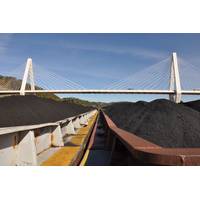Mountain Size Trouble for Australian Coal
Global coking coal supplies have been drastically interrupted by a small stretch of rail that wraps around a modest-sized Australian mountain range – and repair crews are unable to find a quick fix. Australian rail operator Aurizon Holdings Ltd said on Friday it would take another four weeks to repair the Goonyella line, which transported 118 million tonnes of mainly coking coal in 2016 and has been hit by landslides. The company said that its cyclone-damaged Blackwater coal haulage line - the second major rail corridor after Goonyella - would reopen on Monday at reduced capacity.
ABB Debuts Energy Saving Transformer
Breakthrough technology delivers significant weight reduction and energy savings in rail transportation. ABB unveiled its next-generation traction transformer designed to reduce the weight of on-board components and ensure more energy-efficient rail networks, two of the rail industry’s priority objectives. Named Effilight, the product was unveiled as a ‘world premiere’ at InnoTrans, the leading global rail industry symposium, being held in Berlin, Germany, from Sept 20 to 23, 2016. Effilight can potentially reduce the total weight of a train’s traction component by up to 20 percent, equivalent to the weight of around 20 passengers.
ABB substations For Swiss Railways
Zurich, Switzerland, April 20, 2015 – ABB, the leading power and automation technology group, has won orders worth around $30 million from the Swiss Federal Railways (SBB), the national Swiss rail operator, and from the private Matterhorn Gotthard Railway to help boost power and increase capacity on one of the world’s most comprehensive and reliable rail networks. The order was booked in the first quarter of 2015. Three new traction substations being supplied by ABB will enable SBB and the Matterhorn Gotthard Railway to increase their capacity to meet rising traffic volume in southwestern and central Switzerland. The work will be completed by 2018.
US Rail Jams Force Rush to Roads and Rivers

U.S. coal-burning power utilities are being forced to turn to barges and more expensive trucks to move coal, desperate to shore up stockpiles left dangerously low by the widespread bottlenecks on rail networks. The shift in how coal is being delivered to some power plants from mining regions such as Illinois Basin and comes amid persistent railroad delays that began during last year's severe North American winter. The delays have been perpetuated also by a surge in rail deliveries of crude oil and grain, leaving power producers such as FirstEnergy Corp scrambling for transport alternatives before winter sets in, potentially adding to costs.